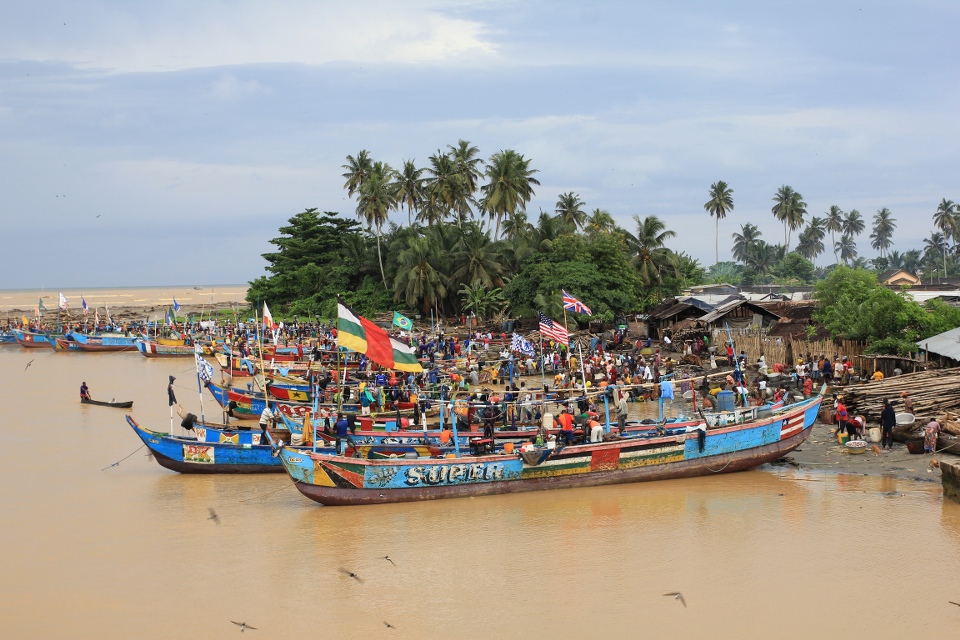Some market women milled around on a sweltering Monday afternoon at the Elmina fishing harbor near the port city of Cape Coast, in the central region of Ghana. Others sat chatting in the shade provided by a makeshift structure along the Atlantic Ocean. Drenched in sweat and with mist swirling about me, I trudged through a nearby market and to where dozens of fishing vessels had come to dock.
It didn’t seem like a productive day, although a few fishermen’s canoes carried whatever their nets were able to trawl from the seabed. I had my first real-world sighting of a living octopus – a baby one. But there were also baby starfishes, shrimps, squids and little crabs. It was evident what was happening here, and that’s exactly what I had come to look for.
I was one of scores of journalists from across Africa taking part in a training course on sustainable fisheries hosted by the World Bank and the African Union Inter-African Bureau for Animal Resources (AU-IBAR), in collaboration with USAID and the West Africa Sub-Regional Fisheries Commission.
During the four-day event, a number of speakers said conserving the resources of the ocean not only creates livelihoods for fishermen and their families but also ensures a source of food for hundreds of millions of people.
Lamenting how over-exploitation of the world’s largest traded agricultural commodity cheats both fishermen and consumers, they said an influx of vessels from overly-fished regions of the world to Africa was resulting in fish numbers dwindling fast to dangerously low levels.
Pointing to an approaching boat. Nana Kwesi Duncan, the chief fisherman at the Elmina harbor, said “this one that’s coming is for trawling…”
We turned and saw the wooden structure, not much larger than a canoe. There were several young men aboard. One of them looked no older than 10.
Ignoring our focus on the lad, Nana continued, “they fish octopuses, squids, lobsters, cassava fishes and the rest…” He said boats like the approaching one are semi-industrial vessels that trawl the ocean floor, but that there were also larger non-African ones further out at sea.
In his opening remarks, the World Bank country director for Liberia, Ghana and Sierra, Henry Kerali, said over the past decades, Africa’s fisheries rapidly expanded without proper governance or management.
“In other words, there are too many boats and too many fishers chasing too few fish. The consequence has been biological degradation of fish resources and substantial economic losses,” he said.
Organizers told journalists that fish account for more than half of the total animal protein people eat and that it provides essential food security – particularly important in countries such as Liberia and Sierra Leone as they recover from Ebola.
Several references were made to the improvements both countries have made in fishery management. In December for instance, the European Union and Liberia signed a five-year Sustainable Fisheries Partnership Agreement setting out the fishing opportunities for EU vessels and the financial compensation to be paid to Liberia.
The agreement also earmarked support for the fisheries policy of Liberia, including the reinforcement of its monitoring, control and surveillance capacity.
Living in a country with an Atlantic coastline of about 579 km and freshwater resources comprising rivers, lakes, lagoons, creeks and streams, I never thought that fish – the major source of animal protein for us Liberians – was a resource that’s depletable.
The fishery sector in the country provides livelihoods and full-time employment for more than 11,000 people, and for perhaps hundreds of thousands more on a part-time basis, according to the Food and Agriculture organization. This makes the sector a big contributor to the economy.
This is why I endorse the commitment my colleagues and I made in Elmina to harness the power of the media in support of sustainable fisheries in Africa. Otherwise, as one of the facilitators aptly put it: “Where will the fish come from to feed the world growing population?”

